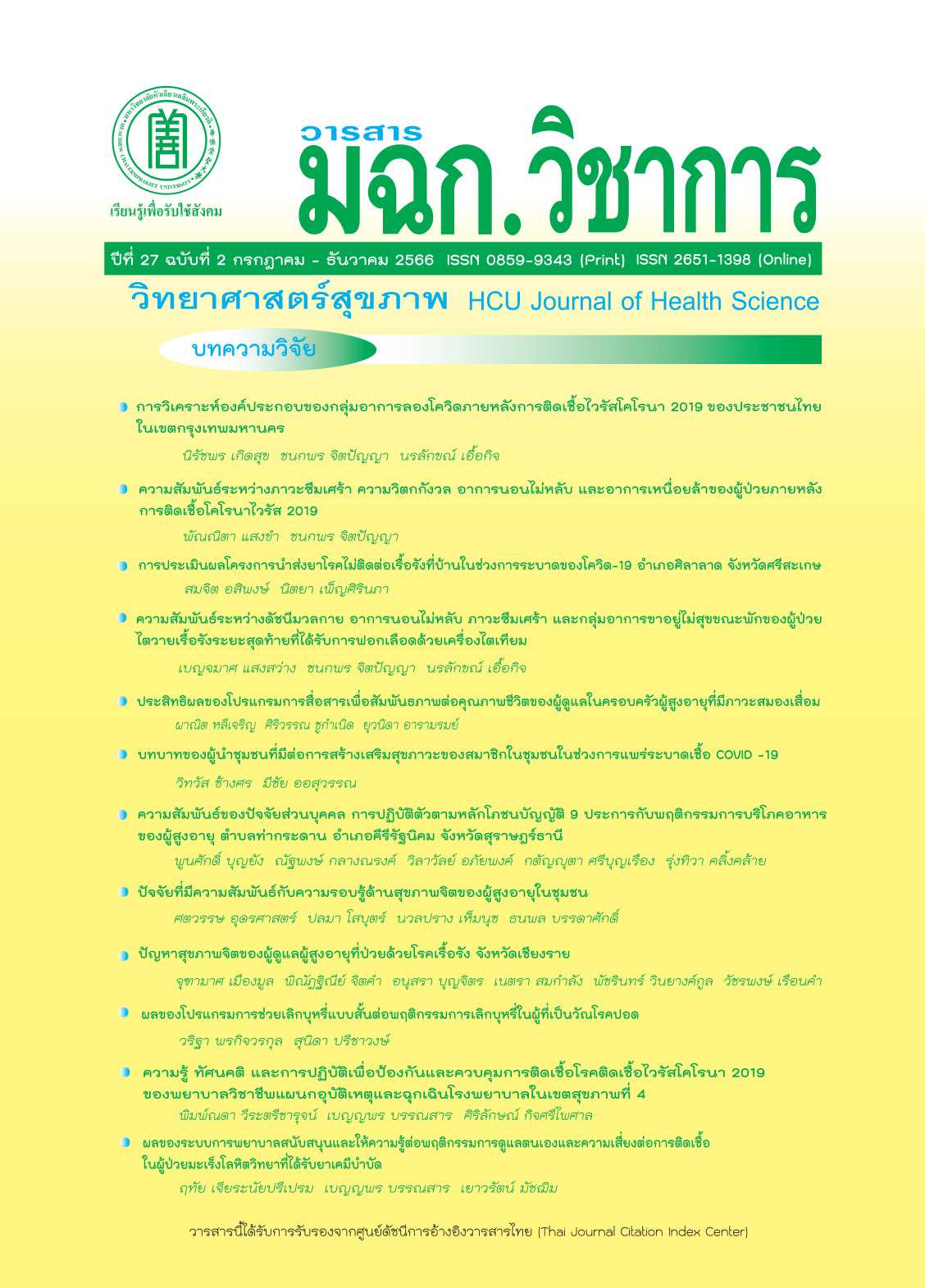Knowledge, Attitude and Practices to Prevent and Control Coronavirus Disease 2019 among Emergency Nurses in hospital with in 4th Public Health Region
Keywords:
knowledge, attitude, practices to prevent and control Coronavirus Disease 2019, emergency nursesAbstract
This correlational descriptive research aimed to study the knowledge, attitudes and practices related to the prevention and control of Coronavirus disease 2019 (COVID-19) as well as the relationships between these factors, among emergency nurses in hospitals within the 4th Public Health Region. The study involved a total of 167 participants. The research tools consisted of questionnaires assessing knowledge, attitudes and practices for the prevention and control of Coronavirus disease 2019. These instruments were evaluated for content validity by five qualified experts, giving indices of 0.80, 0.95 and 0.90 respectively. The reliability of the questionnaires was also assessed, resulting in reliability coefficients of 0.81, 0.91, and 0.93, respectively. Data were analyzed using descriptive statistics and Pearson’s product moment correlation coefficient.
The results showed that the level of knowledge about Coronavirus disease 2019 was at a fair level (Mean = 19.42, S.D. = 2.37), the scores of attitudes towards Coronavirus disease 2019 were at a good level (Mean = 4.04, S.D. = 0.45) and scores of prevention and control of Coronavirus disease 2019 were at a very good level (Mean = 2.88, S.D. = 0.17). Knowledge and attitude were at a low level of positive correlation (r = 0.223, p < 0.01 and r = 0.247, p < 0.01, respectively) with prevention and control of Coronavirus disease 2019.
The results of the research can be used as basic information for knowledge promotion plans and attitudes for the prevention and control of Coronavirus disease 2019 among further groups of emergency nurses in hospital within the 4th Public Health Region.
Downloads
References
World Health Organization. Coronavirus disease (COVID-19) pandemic [internet]. 2022 [cited 2022 Oct 1]. Available from: https://www.who.int/emergencies/diseases/novel-coronavirus-2019
Department of Disease Control. Coronavirus disease 2019 situation report [internet]. 2022 [cited 2023 Feb 12]. Available from: https://ddcportal.ddc.moph.go.th/portal/apps/opsdashboard/index.html#/20f3466e075e45e5946aa87c96e8ad65 (in Thai)
Picheansathian W. Personal Protective Equipment for COVID-19 by Health Care Workers. TJNMP 2020; 7(1):7-24. (in Thai)
Nasueb S. Economic and social impact from the outbreak of Covid-19 on a global scale and in Thailand. Nonthaburi: Department of Disease Control; 2021. (in Thai)
Prommongkol J, Seesong N, Dowjaeng N, Namket R, Nittayasuth N. Epidemiological characteristic of coronavirus disease 2019 [COVID-19] among healthcare workers during the pandemic, 1 January 2020–12 March 2022. Weekly Epidemiological Surveillance report, Thailand 2022;53(29):441-52. (in Thai)
Memish ZA, Zumla AI, Al-Hakeem RF, Al-Rabeeah AA, Stephens GM. Family cluster of Middle East respiratory syndrome coronavirus infections. NEJM 2013; 368(326):2487-94.
Bloom BS. Taxonomy of education objectives: The classification of education goals: Handbook 1: Cognitive domain. 20th ed. New York: David McKay; 1964.
Ministry of Public Health. General information in 4th Public Health [internet]. 2020 [cited 2020 Oct 8]. Available from: https://rh4.moph.go.th/about_r4.php (in Thai)
Kaiwan Y, Phlaprom K. Basic thesis. Bangkok: Pimdee; 2010. (in Thai)
Aneksook S. Statistical methods for research. 3rd. Chonburi: Burapha University; 2009. (in Thai)
Meehanpong P, Chatdokmaiprai K. Assessing quality of research instrument in nursing research. JRTAN 2018;19(1):9-15. (in Thai)
Dixiao Y, Wangsrikhun S, Yothayai C. Knowledge, attitudes, and practices regarding COVID-19 management among emergency nurses in Chengdu, The People’s Republic of China. Nursing Journal CMU 2022;49(4):1-14. (in Thai)
Chidvilay S. knowledge, attitudes and behaviors related to the prevention and control of infection in hospitals nursing profession Ratchaburi. [Thesis]. Nakornpathom: Silpakorn University; 2013. (in Thai)
Kawtong P. Factor affecting infections surveillance control by nurse in a medical department of Phramongkulklao hospital. [Dissertation]. Bangkok: Kasetsart University; 2010. (in Thai)
World Health Organization. Coronavirus disease (COVID-19) pandemic [internet]. 2022 [cited 2022 Oct 1]. Available from: https://www.who.int/emergencies/diseases/novel-coronavirus-2019
World Health Organization.Coronaviruses (COVID-19) [internet]. 2020. [cited 2022 Dec 10]. Available from: https://www.who.int/news-room/q-a-detail/q-a-coronaviruses
Ajzen I. Attitudes, personality and behaviour. 2nd ed. Milton-Keynes: Open University Press/McGraw-Hill; 2005.
Yeunyow T, Promwong W, Kadsanit K. Knowledge, attitude and prevention behavior of Coronavirus disease 2019 (COVID-19) infection among nursing students in Boromarajonani College of Nursing, The North Eastern Region Network. UDHHOSMJ 2021;29(2):204-13. (in Thai)
Downloads
Published
How to Cite
Issue
Section
License
Copyright (c) 2023 HCU Journal

This work is licensed under a Creative Commons Attribution-NonCommercial-NoDerivatives 4.0 International License.
บทความที่ได้รับการตีพิมพ์เป็นลิขสิทธิ์ของวารสารวิทยาศาสตร์สุขภาพและสุขภาวะ
ข้อความที่ปรากฏในบทความแต่ละเรื่องในวารสารวิชาการเล่มนี้เป็นความคิดเห็นส่วนตัวของผู้เขียนแต่ละท่านไม่เกี่ยวข้องกับมหาวิทยาลัยหัวเฉียวเฉลิมพระเกียรติ และคณาจารย์ท่านอื่นๆในมหาวิทยาลัยฯ แต่อย่างใด ความรับผิดชอบองค์ประกอบทั้งหมดของบทความแต่ละเรื่องเป็นของผู้เขียนแต่ละท่าน หากมีความผิดพลาดใดๆ ผู้เขียนแต่ละท่านจะรับผิดชอบบทความของตนเองแต่ผู้เดียว




